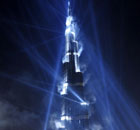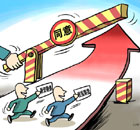Global General
Terrorism plot in Baghdad thwarted, says Iraq
(Agencies)
Updated: 2010-01-13 03:23
 |
Large Medium Small |
BAGHDAD: Iraqi forces arrested suspected insurgents and seized a huge cache of explosives Tuesday, in a crackdown across the capital that brought parts of the city to a standstill.
The security measures demonstrated the everpresent fear that insurgents will carry out more bombings, like the ones against government buildings in past months that killed hundreds, ahead of the March elections.
The government's announcement that it had arrested 25 suspects and seized 880 pounds (400 kg) of military grade explosives also set off bitter accusations from some Sunni politicians that the government had exaggerated the incident to burnish its security credentials.
The charges laid bare once more the stark lack of trust in Iraq between the Shiite-dominated government and the Sunni Muslims who oppose the government.
There was no way to independently verify the reports.
An explosives expert said if the figures al-Moussawi quoted were true, then the security forces had seized enough explosives to make around 120 suicide vests, or around ten average-size carbombs, or a giant truckbomb big enough to blast a crater 32 feet (10m) deep in a tarred road.
The expert spoke on condition of anonymity because he was not authorized to speak to the media.
"This will not prevent the insurgents from attacking, but it will slow their operations," said analyst Tim Brown at GlobalSecurity.org. "If the reports prove true, it represents a major success for the Iraqi government."
The sweep followed hours of cordon and search operations across the capital. Such operations have become rare since security in Iraq improved in 2008. However, every couple of months, insurgents still succeed in carrying out horrific bombings. Hundreds were killed when blasts targeted government institutions in central Baghdad in recent months.
The issue of security is becoming increasingly politicized ahead of March 7 polls. Sunni lawmakers were quick to question whether the lockdown ordered by the Shiite-dominated government on Tuesday was really necessary and emphasized the inconvenience it caused ordinary Iraqis who could not get to work or school.
"The government is trying to leave the citizens with the impression that there is a battle. They terrified and shocked the people," said legislator Saleh al-Mutlaq. "We think that these measures are totally unjustifiable."
Iraqi security forces are increasingly taking over duties from the US military, whose combat units are scheduled to leave by the end of August. The stakes are especially high for the prime minister's Rule of Law coalition, which is campaigning on its ability to protect citizens and its record in reducing violence.
Sunni lawmaker Dhafir al-Ani said that the government is preying on people's fears with these exercises to boost their chances in the polls.
"Now (the government) is afraid of losing their authority, they have started to beat the drums of war and making people live in a military atmosphere ... We also noticed how people were greatly annoyed by these measures."
Iraq's nationwide election will be a crucial test whether Iraqis can vote in a government capable of overcoming deepening ethnic and sectarian rivalries, or whether those divisions will dissolve into violence that threatens the country's unity and regional stability.
Tensions have already arisen after a government committee charged with keeping supporters of the Saddam Hussein regime out of politics recommended that al-Mutlaq's party and 13 others be banned from the elections over alleged links to the former dictator.
"Members of those entities were personnel of the former regime's repressive security apparatus, or Mukhabarat (secret police) officers, and some of them were collaborators with the former regime," said Ali al-Lami, the head of the committee.
The potential exclusion of al-Mutlaq, who holds the second largest bloc of Sunni seats in parliament, raised fears that Sunnis might boycott the polls again, as they did in a January 2005 election. That boycott was followed by a surge in insurgent attacks.










